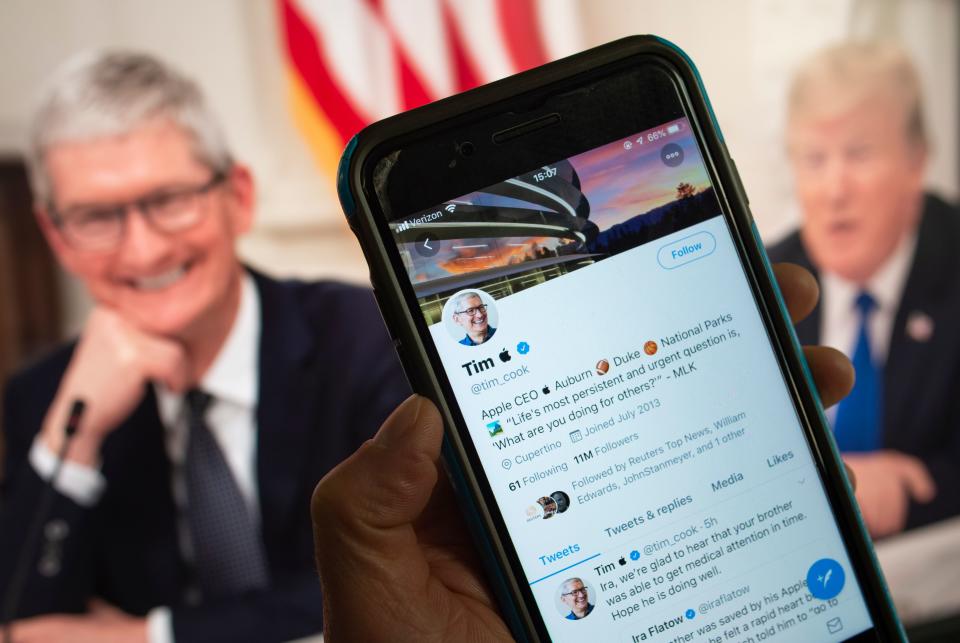Apple’s Tim Cook defends decision to fight DOJ on iPhone ‘backdoor’

Apple (AAPL) CEO Tim Cook again defended his company’s decision not to introduce a so-called “backdoor” to its products that would give law enforcement greater access to the tech giant’s devices during criminal investigations.
Cook was asked by a participant at the company’s annual shareholders meeting to comment on accusations that it wasn’t fully cooperating with the investigation into a shooting at the Naval Air Station Pensacola, Florida, in December.
“We take exception to the characterization,” Cook told the audience at the event held at Apple’s Cupertino, California, headquarters.
“We have supplied all of the information we have on all of the requests we have received,” he said. “Don't think for a second that we have something that we aren't giving.”
Apple has been in a continuous standoff with the Department of Justice over accusations that it isn’t working to aid the department in the Pensacola investigation because it encrypts its devices, preventing law enforcement officials from fully accessing content they see as potentially valuable.
In January both President Donald Trump and Attorney General William Barr called on Apple to assist with its investigation, with Barr saying the company hadn’t provided any “substantive assistance” in the case.
The problem with a ‘backdoor’
The government is seeking to unlock an iPhone belonging to 21-year-old gunman Second Lt. Mohammed Alshamrani in the hopes it will provide greater investigative details. Apple, however, says it has provided the government with all of the data it has from the shooter’s iCloud account.
But the government argues that isn’t good enough, and needs to have access to Apple’s devices via a special backdoor that would give law enforcement the ability to crack an iPhone’s encryption.
The problem with that, Cook says, is that such a mechanism could then be exploited by others outside of law enforcement.
“You put a backdoor in your house and anyone can come in the backdoor. And so the phone is the same way,” he told shareholders.
Apple made the security of its devices one of its key selling points during a time when user privacy has become a key issue for consumers. The company famously posted a massive billboard outside of the annual CES consumer electronic trade show in Las Vegas in 2019 trolling competitors like Google and Amazon that collect user data, something Apple says it opposes. “What happens on your iPhone, stays on your iPhone,” the billboard stated.
Ahead of CES, Apple touts 'what happens on your iPhone, stays on your iPhone' with privacy billboard in Las Vegas https://t.co/Mp7iLWon7Q by @ChanceHMiller pic.twitter.com/uhnBFlNOFp
— 9to5Mac.com (@9to5mac) January 5, 2019
It’s not just Cook who opposes a backdoor mechanism for devices like the iPhone. Security experts across the spectrum say such a move would immediately create an exploitable vulnerability in Apple’s devices, putting the privacy of every user around the world at risk.
What’s more, if Apple gave the U.S. access to a backdoor, authoritarian regimes such as the Chinese government could use the tool to spy on dissenters.
As Cook himself explained, “You can never have a backdoor just for the good guys.”
More from Dan:
Samsung’s foldable Galaxy Z Flip feels like the start of a revolution
Nvidia reports record data center revenue, but warns of coronavirus impact
Got a tip? Email Daniel Howley at [email protected] or [email protected], and follow him on Twitter at @DanielHowley.
Follow Yahoo Finance on Twitter, Facebook, Instagram, Flipboard, SmartNews, LinkedIn, YouTube, and reddit.
